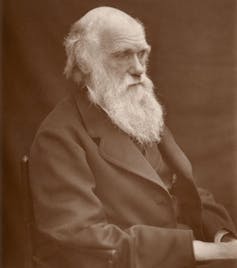Recent debates around transgender people and sexual diversity have been marked by essentialism, a profoundly conservative mindset with deep links to religious and metaphysical dogmatism. It is a stance through which conservative thinkers seek certainty in a world of change and fluidity.
Essentialism comprises three key ideas.
First, there is the idea that nature is divided into discrete kinds of things, which are completely and definitively distinct from each other. For example, there is the view that living things are fundamentally different from non-living things, or that human beings are fundamentally different from other animals.
Second, there is the idea that these differences are eternal and necessary. This sometimes takes the form of the religious doctrine that God created the world and all the things in it in accordance with an unchanging typology. But the idea can also be attributed to Plato, the father of Western philosophy, who postulated eternal and changeless “forms” that worldly things copied and instantiated. If a particular thing is an instance of an eternal metaphysical form, according to this theory, it must have clearly delineated properties.

Third, essentialism suggests that each kind of thing has an “essence”, which requires it to maintain its distinctness by acting in a way that is true to its nature. If God created things as clearly distinct from one another, then these distinctions become sacrosanct. Another example is Descartes’ view that the essential difference between human beings and animals is that only human beings have rational souls.
Many implications, including ethical ones, have been drawn from such claims. To say of an organism that it has an “animal nature” implies that it falls outside the purview of our moral responsibilities, while the existence of “human nature” implies that a person is subject to various moral norms and prohibitions.
Read more: Guide to the classics: Plato’s Republic
Rejecting essentialism
There are strong reasons for rejecting such essentialism. The first of these is Darwinism. It is a commonplace of modern biology that human beings evolved from other life forms. Indeed, all the life forms that inhabit the earth today evolved over aeons of time from earlier life forms and from non-organic matter.
Those who reject this scientific consensus for religious or other reasons do so because they want to maintain the links between essentialism and a priori moral principles. This way lies doctrinal and moral dogmatism.

The most obvious implication of Darwin’s theory of evolution by natural selection is that natural types – as exemplified in biological species – are not eternal or changeless realities. Species change all the time. The human species has changed over the large spans of time which are required for natural selection to do its evolutionary work.
It follows that there is no human essence and no changeless typology that marks off human nature from the rest of the animal kingdom or from the world of things more generally.
There are also ideological and ethical reasons for avoiding essentialism. The view that human beings are essentially different from other animals supports the view that humans have a unique moral standing. It used to be argued that because animals do not have souls or minds, it was morally legitimate to use them in any way we pleased. The religious version of this argument is that God created animals to be of use to humans. Add to this the argument that animals do not feel pain (because they do not have minds) and all kinds of cruel practices are legitimated. Peter Singer has labelled these theories “speciesism”.
Racism is another example of this way of thinking. The basis of this view is also a form of essentialism: in this case, the view that there is an essential difference between black people and white people.
The scientific challenge to racism is data that shows the differences are genetically very slight. The moral challenge is to argue that they are irrelevant. During periods of slavery, colonialism and imperialism, racism often took the form of empirical claims some people were inherently and necessarily less intelligent than others, or more prone to violence, or were in need of strong discipline, or were “primitive” and in need of civilisation. People of mixed race are troubling to racists, because they cross essential boundaries, blurring the difference between “us” and “them”.
Nationalism, racism and certain views about class are examples of the inherently oppressive quality of essentialism. Economic and social thinkers (sometimes inspired by misunderstandings of Darwin) used to argue that members of the working classes (sometimes referred to as the “lower orders”) were inherently stupid and dissolute, so it was doing them a favour to keep them working in the factories and pits for long hours, because only in that way would they ever be productive.
Never mind that talent is distributed arbitrarily across all socio-economic classes and needs only the opportunity to develop in individuals, no matter what class they belong to. As for nationalism, the view that some people are inherently of less worth than others because of their nationality is not the least important of the many causes of war.
Read more: Friday essay: transgenderism in film and literature
Essentialism and sexual oppression
Essentialism also lies at the heart of many sexist practices and forms of life. To cite Aristotle: “The male is by nature superior, and the female inferior; and one rules and the other is ruled; this principle, of necessity, extends to all mankind.”
According to such essentialism, certain things are said to have inalienable features and, as a result, have a lower or higher status on an imagined hierarchy. Aristotle grounded his view on biological theories about women and men and their sexual functions that we now know were incorrect, but the key point here is that he attributed a different metaphysical “nature” to each sex.
When biological differences are turned into immutable essences of moral significance, they can be used to justify practices that are oppressive and unjust. It is easier to justify preventing women from taking a full part in public and commercial life if one asserts that it is the nature of women to be housekeepers and mothers.
Essentialism also plays a part in the oppression of sexuality. If one maintains that the essence of the male/female distinction is that it is the basis of procreation, then homosexuality can be proscribed as “unnatural”. But there is no essential purpose to sexuality. While procreation is an important outcome of sexual activity, it is not its only function.
Transgender identities show there are no essential links between sexuality, gender and biology. Trans activists deny that apparent biological differences create immutable gendered essences. The claim is not that transwomen are biological men who prefer to dress and act like women; it is that, because biological essence does not determine gender identity, transwomen are women.
This is a claim that a male or female identity is not defined on the basis of any material reality of embodied maleness or femaleness, but on a higher abstracted or psychological plane. While it might be difficult for non-trans people to understand what this plane would be, it is clear that it eschews any essentialist definition of what a woman or a man should be.
When gender differences are turned into immutable essences, one can give them moral significance and use them to justify practices which are oppressive and unjust. Nothing can be more offensive to an essentialist than the blurring of boundaries represented by transgender identification. It is the fixing of empirical differences into the categories of metaphysical essences that does the work of grounding oppressive principles.
Prejudices of all kinds usually take an essentialist form. It will often be found that the standards of human excellence propounded by essentialist theory are the standards held by the propounder of the theory. This is why essentialism is usually oppressive to anyone who is “other” in relation to the essentialist. To an essentialist, difference is pejorative.
Read more: Judith Butler: their philosophy of gender explained
Existence precedes essence

By contrast, Jean-Paul Sartre’s famous phrase “existence precedes essence” proposes that our self-conscious mode of being is not determined by any essential human nature. The “existentialism” he founded is the opposite of essentialism.
Rather than claiming that our human nature, our socialisation, our genetic inheritance – or any other material or historical force – determines who we are and what we ought to do, existentialists make the radical claim that it is our subjectivity, our project of self-making, which projects itself into the world and uses those factual and formative elements to forge an identity for itself – an identity of its own choosing.
Unlike essentialism, which seeks to fix human life into the definitions its metaphysical categories bring with them, existentialism reminds us that our initiative and creativity are vital in the living of our lives.
Existentialism is anti-essentialist in relation to human existence. It claims the self is not a fixed entity. Human beings create their own modes of being, their values, and their destinies. And this applies to sexuality. Gender is an existentialist project, rather than a fixed essence.
Depending as it does on ancient metaphysical and religious doctrines, essentialism seeks normative certainty in a fluid world. It suggests that everything should act in accordance with its eternal and necessary nature. It is an inherently conservative stance which ought to be expunged from contemporary ethical and political debates.
Stan van Hooft does not work for, consult, own shares in or receive funding from any company or organization that would benefit from this article, and has disclosed no relevant affiliations beyond their academic appointment.
This article was originally published on The Conversation. Read the original article.







